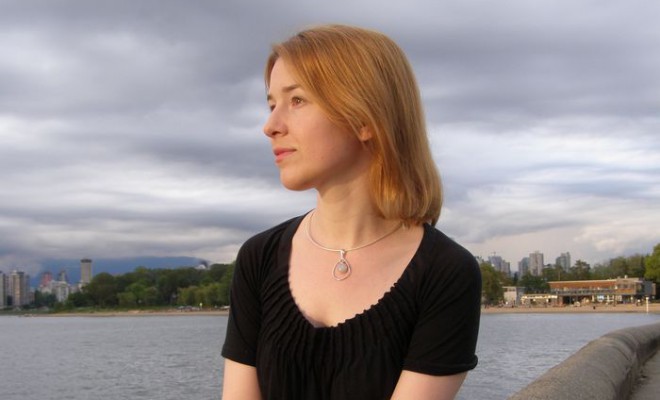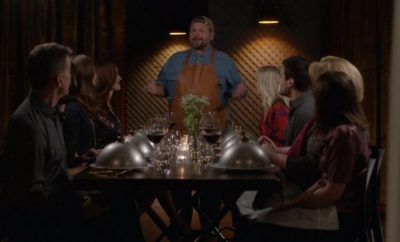
Interviews
Jordan Hall – Carmilla
By: Lisa Steinberg
Q) How did you feel writing this season? Was it different from Season 1?
A) It was and it wasn’t. It is interesting to think about that because the process was very much the same. Ellen [Simpson, series story editor and transmedia writer] and I sat down over Internet chat and hammered out plot points, characters and then I sat and broke story, broke story and broke story. Then, we moved them into the online chart that Ellen made and tried to organize them to all fit together a bit better. This was my first time writing a sequel and in a lot of ways I’m really proud of this season. We took risks and I think there were some amazing work on screen, but I also think we learned a lot about what is sustainable and what isn’t in this format. One of the stellar things about having an engaged fan base is they talk to you about what is working for them and what isn’t. We have a huge amount of information to take into Season 3 if we are lucky enough to get one.
Q) Where and what did you draw from to construct the concept this darker season with Perry as the Dean? Was this part of an original bigger picture for the series?
A) Because I knew we were going to some more tragic places, I put some Shakespearean references. If you go back, they are actually referenced within the show. We’re looking at Romeo & Juliet, Antigone and Butch Cassidy and the Sundance Kid. Antigone was actually a big one for structural reference like Carmilla (Natasha Negovanlis) with the cost of trying to make a different in the world. There were interesting problems that arose with how we narrate our intervention. So, a lot of Season 2 is Laura (Elise Bauman) learning her ideas what it means to be heroic and what it means to make a difference maybe means a change. Those are all structural cornerstones that were great for that.
Q) Where did that idea of the Dean and Perry being possessed come from?
A) There was always the sense that the Dean would have to return. You can’t construct that villain, that major piece, and then never go back to that. At the same time, it was something you couldn’t do immediately in terms of Season 2 because it doesn’t give what has happened the weight and the opportunity to explore what the power vacuum looks like and what the mess looks like. The Dean, in many ways, is in control of a lot of things and that is a different dynamic. This season was meant to begin as Perry looking quite victimized and then it starts to get creepier and creepier so there is a punch at the end. The main arc, though, is still about Carmilla and Laura, what is happening in that relationship and where this miscommunication begins.
Q) You said this season was meant to be darker, was that part of an original picture?
A) Let’s be honest: the dark was always kind of there. This started out a show where a vampire cult was brainwashing girls as fish food for their evil demigod. It’s funny, but it’s also dark. So, in the original one hundred episodes that we planned for (and when I say “planned,” I mean we sketched out an arc) had this bubble for Act 2 and Act 2 is always where things fall apart. When you are looking at Season 1, the characters are dealing with something much bigger than they are and, in many ways, they got very lucky. At some point, luck has to run out and the flaws that were there all along shine, like Laura’s naivety and Carmilla’s apathy and Danny’s restlessness. They have to take their toll—otherwise, as a writer, you’re cheating.
Q) Were there any ideas or plots that didn’t make the cut?
A) There is always so much stuff that ends up on the cutting room floor. One of the absolute difficult things of having a campus this big and limited screen time is that things always get cut for a lot of reasons. My favorite example was from Season 1: after the second trip to the library there was this gag where they were like, “We’re going to the library!” Then, we cut back to them and it is Laura, Carmilla and LaFontaine (Kaitlyn Alexander) and they are just covered in some kind of awful goo – like full on New York at the end of Ghostbusters sludge. Laura says, “We will never speak of this again.” There was no way with the time constraints we were able to do anything like that. Generally, one of the things about the plotting, writing and rewriting process is that the better ideas survive. The ones that don’t survive are weak because they clearly couldn’t fend for themselves.
Q) The show is layered with parallels and foreshadowing, were these meant as clues and breadcrumbs?
A) Mostly the parallels and foreshadowing were just meant as parallels and foreshadowing. But at the same time, everything that goes into the show goes in for a reason. When you are looking for references, you want them to have resonance and weight because you are in this really short format. You need the metaphors made and the people you mention to kind of stand out and carry significance that you couldn’t otherwise plan. In general, I am trying to use as much of what we built in Season 1 and from the original novella as well. We went back to the original text to pull out Vordenberg (Ian D. Clark) and pull out Mattie (Sophia Walker). Even the Dean’s strategies of going to play a victim, like how do you invade a castle? How do you get what you want? We pulled them from the novella. So, those things like the character traits in the beginning we tried as much as possible (especially the ones that really resonate) forward so they would be cohesive.
Q) How did you and Ellen [Simpson] keep things with your ideas counterbalanced?
A) We spin things together. You are in a conversation and you write down everything and then there is the idea that the good ideas live and the bad ideas don’t. You can generally, as a writer, tell what is stronger. Ultimately, the reason I am credited as co-creator is because I make the calls. If there is a hard call to make, I do that. Ellen offered huge amounts of support in terms of writing notes. The process is about doing that first break, re-accessing and re-plan. It’s really a group effort of deciding “this should be here” and “this should be there.” In terms of the trajectory of the jokes, I write the whole season and full drafts, then Ellen reads them and gives me feedback. Then, typically—this is how the writing process works—I see what is or isn’t working for me. Then, with that feedback in mind, I adjust. If Steph [Ouaknine, Carmilla producer] and the team have production concerns, they will give me feedback. That’s how we get it to a place where we can make it.
Q) Was it always Danny who was going to die and was her death meant as any kind of significance to make her a hero after the betrayal?
A) I knew pretty much from the time I started writing Danny (Sharon Belle) back in Season 1 that she was a really wonderful combination of being too reckless and wanting to be noble too much. In the world of Silas, that meant she was going to take on something too big to handle and would get her killed. That was always something that was going to happen. I know Laura completely betrays Carmilla’s trust, but when I think [objectively] about what Danny is doing, it breaks down like this: Danny kills a vampire who, in turn, is threatening to kill a lot of people. I get why people love Mattie. I love Mattie, too, and I built her to be charming and engaging. Sophia did such a great job bringing her to life! That said, she’s also a mass-murdering psychopath who expressed repeatedly she would have no trouble killing everyone on campus. So, I think it is perfectly fair that people want to hate Danny for killing her. In terms of the significance for the narrative, for me, Danny dying isn’t really about the cost of heroism. In a world where they are literally outgunned, it was heartbreaking in some ways to be with her at that moment when she realizes she’s lost, and have her last moments be where she is convincing Laura that it was worth it and that she is fighting while clearly being so terrified. That was an amazing and painful moment to discover. Then, it is so much worse than that because death isn’t even the worst thing that could happen to Danny.
Q) The transmedia played a bigger role this season and seemed to provide a lot of side information not played out in the series, what was the thought behind this?
A) Collaboration like with Ellen is so essential is because she does such a great job on transmedia. Ellen writes all of those and puts up with me being late. I think the transmedia in many ways, yes, it expanded the story, but I feel like it has been doing what it has always been doing, which is build the world laterally. The vertical prep with the narrative, so to speak, doesn’t actually allow for world-building because they are short little episodes. We definitely take the Twitter and Tumblr feed as an opportunity to build on things that we don’t have time or space for in the episodes themselves. You don’t have to be a fan of Frankenstein to realize they resurrected JP. You see the effect. But we can write the scene and let the audience’s imagination do the work. The feed might not be totally necessarily, but I enjoy the way it enriches the world of the series. That is one of the things that is spectacular about Ellen!
Q) What do you ultimately hope that Creampuffs take away from the totality of season two?
A) What I am hoping they are taking away is this thought that real change and real love is worth fighting for, worth the struggle and worth the ideas you have to sacrifice for them—even if you don’t win in the end. Also, you don’t want to mess with the Dean because she is a scary, scary lady!



You must be logged in to post a comment Login